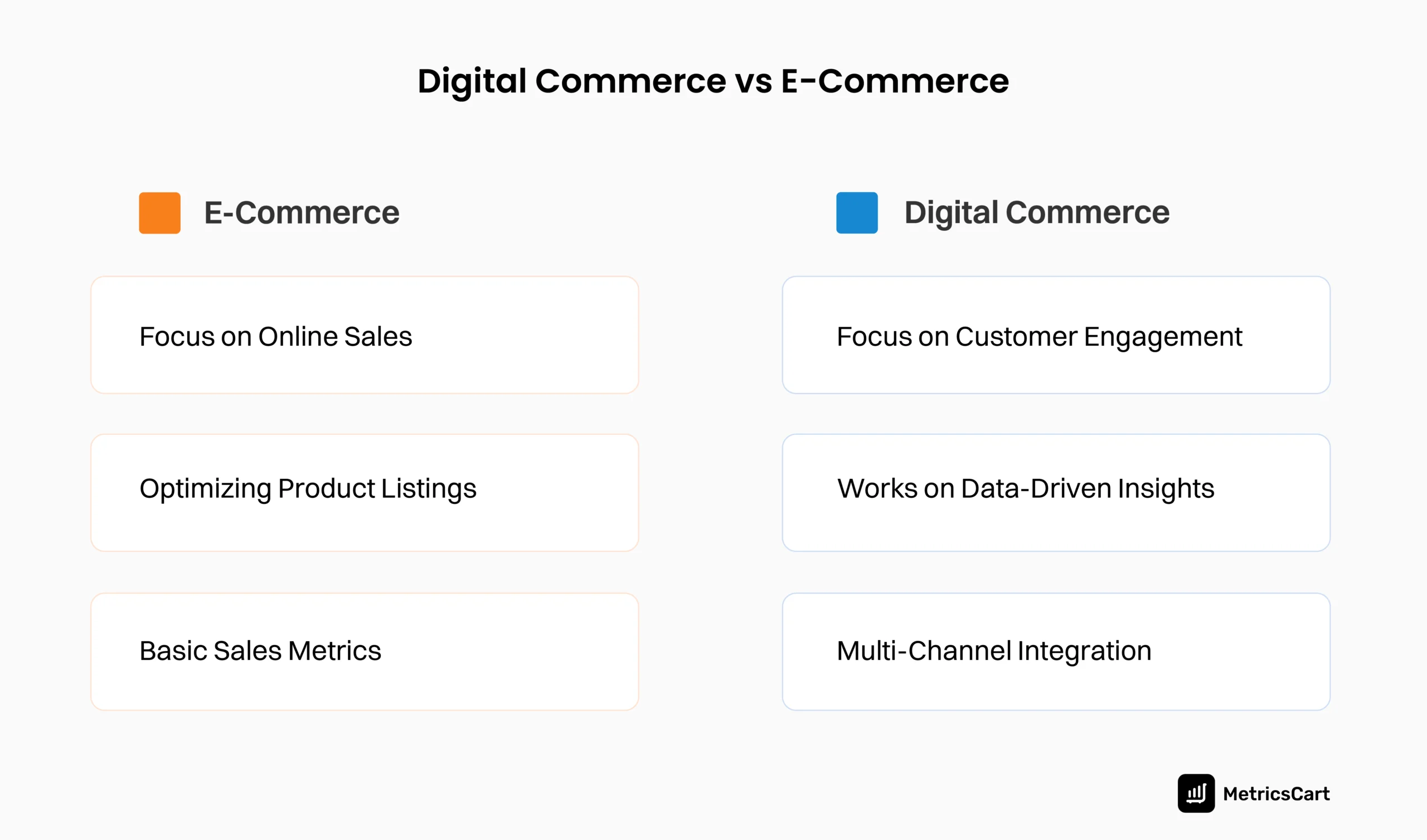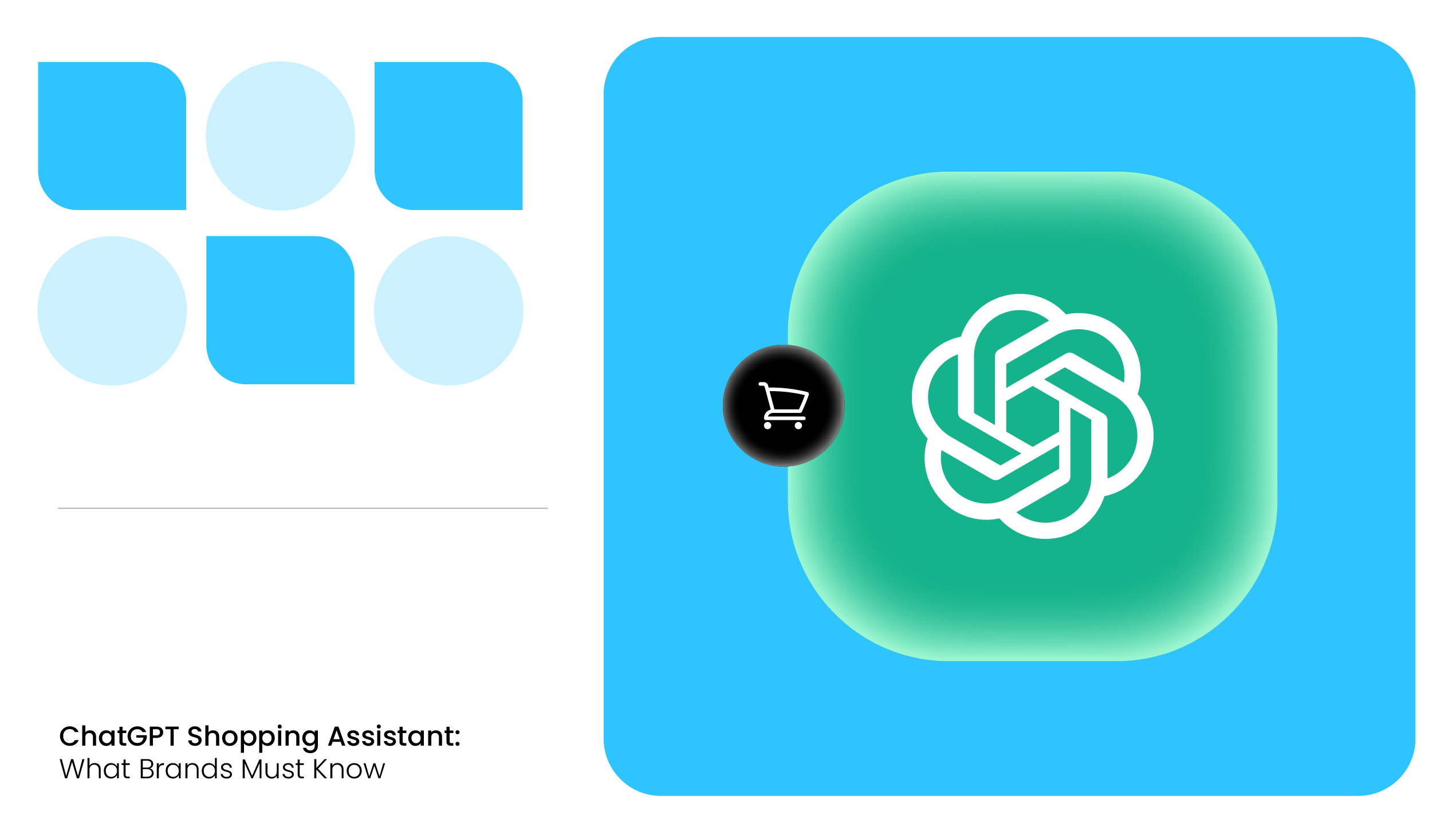Imagine you run an online store selling eco-friendly cleaning products, like reusable bottles and bio-degradable detergents. If your business only involves listing products on a platform like Amazon or your website and processing transactions, that’s e-commerce in action.
But let’s take it a step further. Suppose you’re using tools to analyze customer data, run personalized marketing campaigns, ensure seamless delivery, and engage with customers post-purchase through social media or email. In that case, you’ve entered the realm of digital commerce.
This difference between digital commerce and e-commerce matters deeply, especially for brand managers, digital shelf managers, and those focused on user experience. A third-party digital shelf analytics software can be a resourceful choice for professionals when it comes to e-commerce goals or larger digital commerce analytics.
What Is Digital Commerce?
Digital commerce, or d-commerce, extends beyond the confines of traditional e-commerce. It encompasses the entire process of marketing, selling, delivering, and servicing products or services through digital channels.
This holistic approach integrates various touchpoints and technologies to create a seamless customer journey.
READ MORE | Ever heard of the term ‘Phygital’ in e-commerce? Check out our blog on Exploring Phygital In E-commerce with Industry Examples
Difference Between Digital Commerce and E-Commerce
While e-commerce has been a cornerstone of online business for years, the emergence of digital commerce represents a significant shift in how businesses interact with customers.
For professionals managing brands, digital shelves, or customer experiences, understanding this distinction isn’t just theoretical; it’s the key to crafting strategies that meet today’s heightened customer expectations and drive sustainable growth.
Some of the key differences that set them apart are:

Scope
E-commerce focuses on the online transaction of goods and services, facilitating the buying and selling process through digital platforms.
In contrast, digital commerce encompasses a broader spectrum, integrating marketing, customer engagement, data analytics, and post-purchase support to create a cohesive digital ecosystem.
Strategy
E-commerce strategies typically aim to streamline the purchasing process, enhancing website usability and optimizing checkout procedures.
Digital commerce strategies, however, leverage data-driven insights to personalize customer interactions, implement omnichannel approaches, and foster long-term engagement.
Focus
E-commerce centers on facilitating transactions and measuring success through sales metrics and conversion rates.
Digital commerce emphasizes the entire customer journey, aiming to build lasting relationships and brand loyalty by delivering consistent and personalized experiences across all digital touchpoints.
Understanding these distinctions is crucial for professionals aiming to develop comprehensive digital strategies that not only drive sales but also improve overall customer satisfaction and retention.

Digital Commerce Decodes Consumer Behavior
Unlike a static shopping experience, digital commerce uses advanced algorithms, digital shelf optimization, and real-time insights to tailor the experience for each user.
The search bar of any online retail platform is customized to reflect customer preferences and shopping habits. Each transaction contributes to a vast pool of data that helps brands chart out future marketing strategies and operational decisions.
The main steps involved in digital commerce are:
- Building online credibility
- Presenting products online
- Offering secure payment methods
- Fulfilling prompt delivery and customer support
- Engage with customers post-sale
- Analyze shopping data
This data-driven approach shapes how products are advertised, displayed, and supported online. Customer reviews, browsing patterns, and even cart abandonment rates provide valuable insights that brands use to optimize the shopping journey.
Social Commerce Compliments D-Commerce
Social commerce, a subset of digital commerce, integrates shopping experiences directly within social media platforms like Instagram, Facebook, and TikTok.
The Voice of the Customer (VoC) is an integral part of the modern online commerce environment, where customers increasingly rely on social media for product discovery, reviews, and purchases.
For brands, aligning digital commerce strategies with social commerce trends means reaching customers where they spend their time, fostering engagement, and creating seamless pathways from inspiration to purchase.
This integration not only boosts visibility but also drives conversions in a landscape where convenience and connectivity are expected to go hand-in-hand.
READ MORE | How do you convert customer voice to sales? Check out our blog Transform Customer Voices into Sales: Guide to User-Generated Content for E-Commerce Leaders
Conclusion
By adopting a digital commerce mindset, brands can create more personalized and engaging experiences, ultimately driving growth and loyalty in the digital age.
Digital shelf analytics tools like MetricsCart are a great addition to the digital commerce environment as they help you gain insights that help your brand from the initial steps of product design to analyzing customer reviews to cultivate your own unique brand identity.
Step up Your Brand Game and Outshine Competitors!
FAQ
Yes, digital commerce includes e-commerce but extends beyond it. E-commerce is a part of digital commerce, which also integrates other aspects like customer engagement, data analysis, and multichannel support.
Digital commerce is more customer-centric. It focuses on optimizing the overall experience at every touchpoint in the buyer’s journey, from browsing to after-purchase support.
Yes, digital commerce strategies are designed to enhance customer engagement and retention through personalized experiences, loyalty programs, and targeted marketing across multiple digital channels.
Digital commerce incorporates advanced technologies like data shelf analytics to create a seamless, personalized experience across all digital channels. E-commerce mainly focuses on transactional aspects, such as payments and product delivery.
While digital commerce may seem complex, even small businesses can benefit by leveraging digital tools to enhance customer engagement, streamline their operations, and expand their reach across multiple digital touchpoints.







